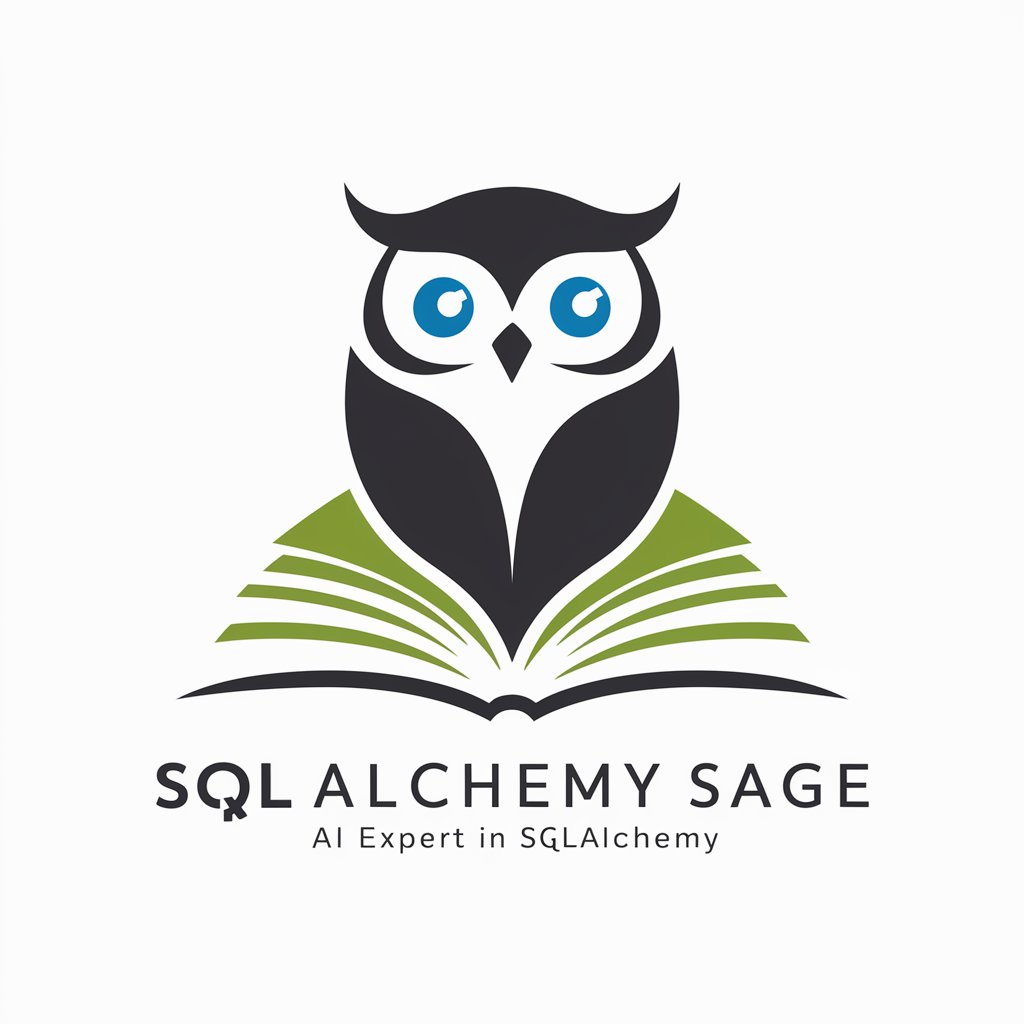SQLAlchemy Sage - database assistant for SQLAlchemy.

Hi there! Ready to dive into SQLAlchemy?
AI-powered SQLAlchemy assistant.
Can you explain how to set up a relationship between two tables in SQLAlchemy?
What are the best practices for querying data using SQLAlchemy?
How do I create a new database using SQLAlchemy?
Can you help me understand how to use SQLAlchemy with Flask?
Get Embed Code
Introduction to SQLAlchemy Sage
SQLAlchemy Sage is a specialized version of ChatGPT designed to provide expert guidance on SQLAlchemy, a popular SQL toolkit and Object-Relational Mapping (ORM) library for Python. The primary function of SQLAlchemy Sage is to assist users in understanding and implementing SQLAlchemy for database interactions in Python applications. This includes helping with tasks such as database setup, schema design, querying, and performance optimization. SQLAlchemy Sage is built to cater to users at various levels of experience, from beginners to advanced developers. Example Scenario: A beginner developer wants to set up a new SQLite database for a Flask application. SQLAlchemy Sage guides them through installing SQLAlchemy, configuring the database connection, and defining the initial models. For more advanced users, SQLAlchemy Sage can provide tips on optimizing complex queries or migrating schemas. Powered by ChatGPT-4o。

Main Functions of SQLAlchemy Sage
Database Setup
Example
SQLAlchemy Sage helps users install and configure SQLAlchemy with various databases like SQLite, PostgreSQL, MySQL, etc.
Scenario
A developer is building a Flask web application and needs to set up a PostgreSQL database. SQLAlchemy Sage provides detailed steps for installing the necessary drivers, configuring the connection string, and initializing the database with SQLAlchemy.
ORM Mapping
Example
Guiding users on how to define Python classes that map to database tables using SQLAlchemy's declarative base.
Scenario
A user wants to create a model for a 'User' table with columns for id, name, and email. SQLAlchemy Sage shows how to define the User class, set up the columns, and handle relationships with other tables.
Query Construction
Example
Assisting in writing and optimizing queries using SQLAlchemy's ORM and SQL Expression Language.
Scenario
A user needs to write a query to fetch all users who registered in the last 30 days. SQLAlchemy Sage helps construct the query using both ORM and core query constructs, explaining the differences and use-cases for each approach.
Schema Migration
Example
Providing guidance on using Alembic, SQLAlchemy's companion library for database migrations.
Scenario
A developer needs to add a new column to an existing table in production without losing data. SQLAlchemy Sage walks them through setting up Alembic, creating a migration script, and applying it to the database.
Performance Tuning
Example
Advising on techniques to optimize database performance, such as indexing, query optimization, and connection pooling.
Scenario
A user notices that their application is slow when retrieving data from a large table. SQLAlchemy Sage suggests adding indexes, optimizing the query structure, and configuring connection pooling to improve performance.
Ideal Users of SQLAlchemy Sage
Beginner Developers
New developers learning Python and SQLAlchemy can benefit from SQLAlchemy Sage's step-by-step guidance on setting up databases, defining models, and writing queries. The tailored support helps them avoid common pitfalls and build a strong foundation.
Experienced Developers
Seasoned developers working on complex projects can use SQLAlchemy Sage for advanced topics such as query optimization, performance tuning, and schema migrations. SQLAlchemy Sage offers insights that can streamline development and improve application performance.
Data Scientists
Data scientists who need to interact with databases for data extraction and manipulation can leverage SQLAlchemy Sage to write efficient queries and manage data schemas, enhancing their workflow and enabling more efficient data analysis.
Educators and Trainers
Instructors teaching database management or Python programming can use SQLAlchemy Sage as a resource to provide clear explanations and examples, making complex concepts more accessible to students.

Guidelines for Using SQLAlchemy Sage
1
Visit yeschat.ai for a free trial without login, also no need for ChatGPT Plus.
2
Familiarize yourself with SQLAlchemy's core concepts, including databases, ORM models, and queries to gain a better understanding of how to interact with SQLAlchemy Sage effectively.
3
Start with a specific question or topic related to SQLAlchemy, like relationships, query optimization, or database migrations. SQLAlchemy Sage can provide personalized guidance based on your skill level.
4
Explore deeper topics like designing efficient schemas, handling migrations, or advanced querying techniques. SQLAlchemy Sage helps clarify complex concepts.
5
Regularly refine your database skills using SQLAlchemy Sage, which can provide code examples, suggestions, and comprehensive explanations to deepen your SQLAlchemy knowledge.
Try other advanced and practical GPTs
.NET Support
Power Your Development with AI

Code Writer and Optimizer
Optimize code with AI-driven insights

IB Math
Empowering IB Students with AI-driven Math Solutions

Fabricio
AI-driven solutions for marketing success

Code Mentor David Kim
Your AI-powered code coaching companion

🏆 シュンスケ式 - WBS(目標達成) 🏆
Structuring Goals with AI Precision

Difficult to Read Kanji Quiz
Master Kanji with AI-driven Quizzes

InsightNotes Assistant
Craft Your Story with AI

NinjaTrader GPT Pro
AI-Powered Trading Strategy Development

Emails Improver
Perfect Your Emails with AI Power

Digital Marketing Mentor v3
Empowering Marketing with AI

POWERSOFT365 Image Finder
Unleashing AI-driven visual discovery

Top 5 SQLAlchemy Sage Q&A
How can SQLAlchemy Sage help me optimize database queries?
SQLAlchemy Sage provides insights on writing efficient queries and helps you understand concepts like eager loading, indexing, and SQL expressions to improve performance.
What are the best practices for setting up relationships in SQLAlchemy models?
SQLAlchemy Sage guides you through defining relationships using `ForeignKey`, `relationship()`, and association tables, explaining when to use one-to-one, one-to-many, and many-to-many relationships.
Can SQLAlchemy Sage assist with data migrations?
Yes, SQLAlchemy Sage offers advice on tools like Alembic, best practices for version control, and how to handle schema changes with minimal downtime.
What advanced querying techniques can I learn from SQLAlchemy Sage?
SQLAlchemy Sage provides tips on using subqueries, Common Table Expressions (CTEs), window functions, and complex filtering to execute powerful database operations.
How does SQLAlchemy Sage personalize advice for my experience level?
SQLAlchemy Sage adjusts its recommendations based on your questions, offering simple explanations for beginners while diving into advanced concepts for more experienced users.
